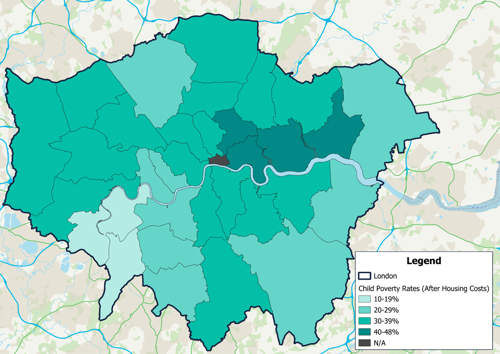
Inclusive growth is one of the key themes underpinning the aspiration to grow the London economy set out in the ‘Towards a new London Plan’ document. This begs the question as to what is meant by the term ‘inclusive economic growth’? We have had to grapple with this question when preparing Inclusive Economic Growth Strategies for local authorities (most recently in LB Greenwich).In the past we have opted for the OECD definition which states that:
Inclusive growth is defined as economic growth that is distributed fairly across society, and which creates opportunities for all[1].
The London Plan review picks up on two key issues which are seen as being relevant to inclusive economic growth: access to employment, and affordable workspace (which we will focus on in next week's article). But is this focus too narrow?
Our view is that inclusive economic growth needs to be a cross-cutting theme that flows throughout the updated London Plan document. Inclusive economic growth cuts across the issues of housing, design, health and well-being, the environment and transport. Whilst we recognise that achieving a strong and dynamic London economy is essential, it cannot be realised without benefitting the people who live here. And, in order for growth to be inclusive, this aspiration needs to be aligned with all elements of development. There are some signs of this within the London Plan review, with references to ‘healthy communities’ and ‘designing for everyone’ but we hope that this can be bought to the fore in any updated Plan.
Some local authorities are ‘ahead of the game’ and recognise the important role which planning can have in supporting inclusive economic growth, and are setting out new planning validation requirements to support this goal.
It is commendable that some London Boroughs where we are working, such as LB Islington have incorporated inclusive economy aspirations into their planning validation checklists. Major developments incorporating employment uses are required to prepare Inclusive Economy Statements. As well as setting out details of any jobs created and local procurement opportunities, they also need to set out potential community benefits and social value initiatives.
Elsewhere across the country, local authorities are increasingly setting out requirements for social value strategies to be submitted alongside major applications. Wirral Council have recently updated their planning validation requirements to include this, and others such as Salford Council have requested this for some time. Whilst this can sometimes prove to be a burden for some developers, other developers we are working with are embracing the requirement for social value strategies. Some are looking to us to help them to monitor their social value impacts more widely so that they can proactively demonstrate their achievements to local authorities and other stakeholders.
So, will we see an increased emphasis on preparing social value strategies as a result of an updated London Plan? We are already seeing an increased requirement for Employment and Skills Plans which can help to support and deliver inclusive growth and social value. We have recently worked with LB Havering for example on one of these to support their flagship Farnham and Hildene scheme, which forms the third phase of the Harold Hill Town Centre regeneration plans. It will deliver 481 much-needed new homes, alongside high-quality retail and community spaces. Given the significance of the scheme, it is essential that the developer can demonstrate how it will support local employment and training opportunities. We therefore welcome this approach and recognise the benefits for developers of having someone with our expertise guide them through the process of preparing these strategies which both meets the Council’s requirements and is deliverable.
Linked to this, Health Impact Assessments and (to a lesser extent) Equalities Impact Assessments are now more routinely being requested as part of the planning process. Again, these are important tools to demonstrate how a development will impact on the local community and particularly diverse groups.
So, why is inclusive economic growth important:

Here is some of our advice to developers, local authorities and the GLA in relation to inclusive economic growth:
When preparing the supporting documents outlined above, it is important that developers:
Being part of a social enterprise, we are all the more passionate about supporting inclusive economic growth, and are well placed to support developers who need to meet local authority requirements in this area. This may involve preparing documents which demonstrate this such as Social Value Strategies or Employment and Training Plans.
If we can help, please do get in touch with either Margaret Collins or Zoe Crampton at GC Insight.
[1] This is based on the OECD definition (2017) Inclusive Growth - Economic growth that is distributed fairly across society (oecd.org)
[2] Labour market in the regions of the UK - Office for National Statistics
[3] UCL 2025 - UK employers less likely to recruit disadvantaged ethnic minority graduates
[4] DWP 2024 - The employment of disabled people
[5] Census 2021 - Highest level of qualification
[6] Trust for London 2024 - Low pay by London borough
[7] Childhood Trust - Child Poverty in London
[8] Trust for London 2022/23 - Children in poverty before and after housing costs
[9] IMD 2019 - Local Authority District summaries